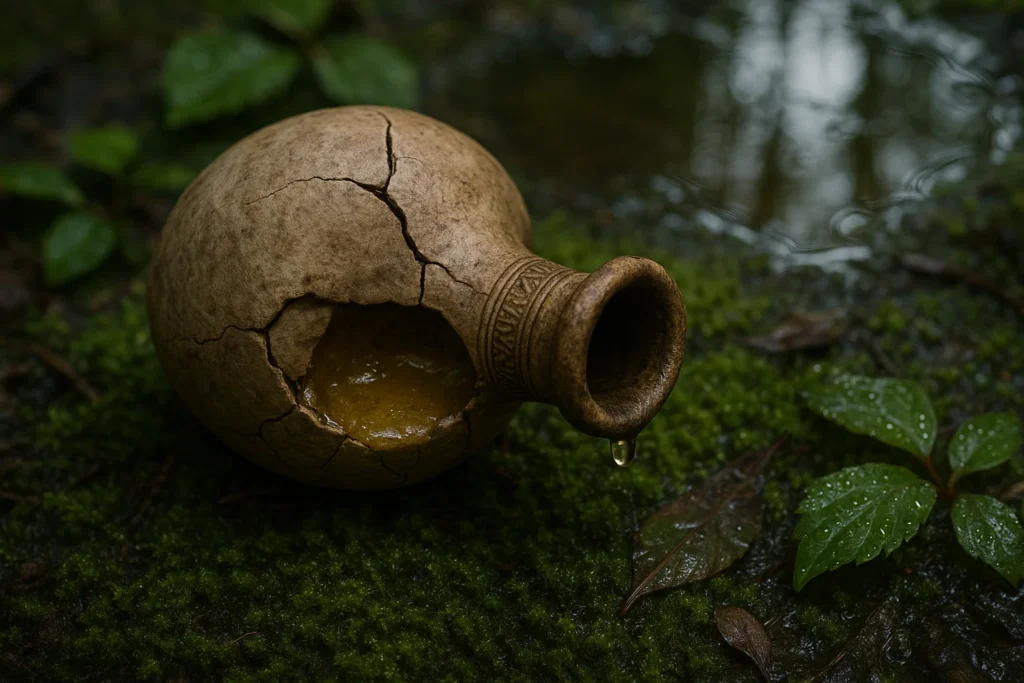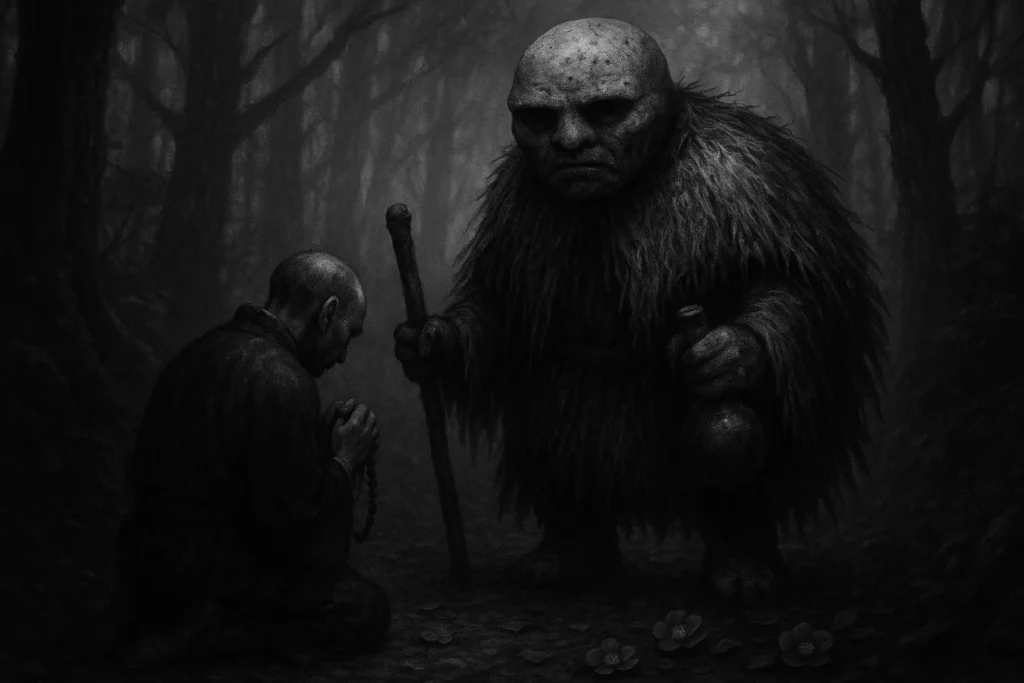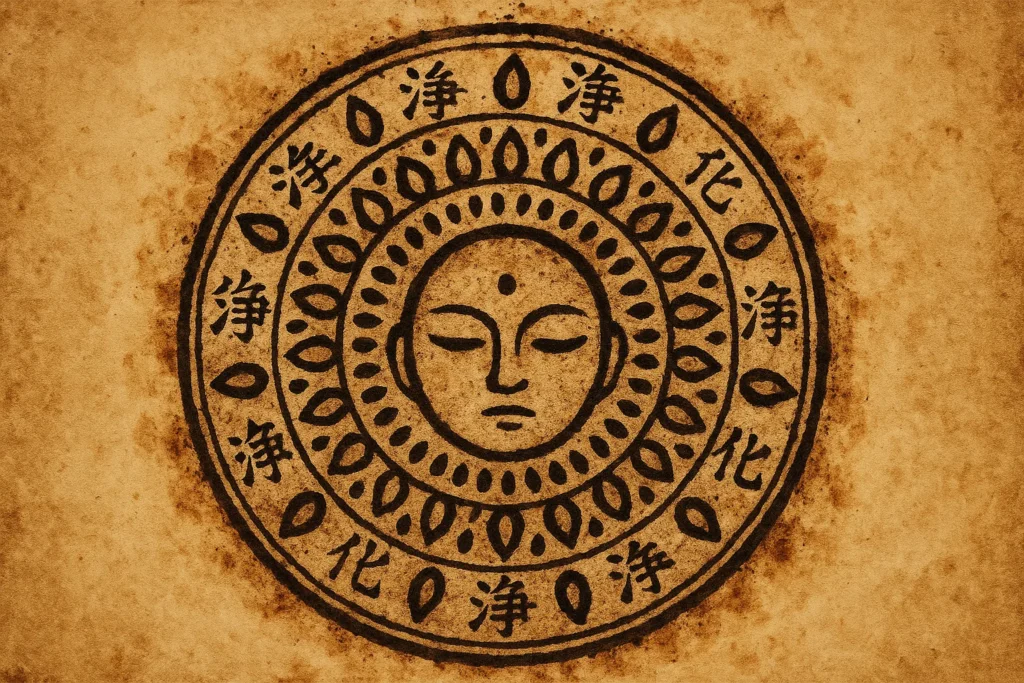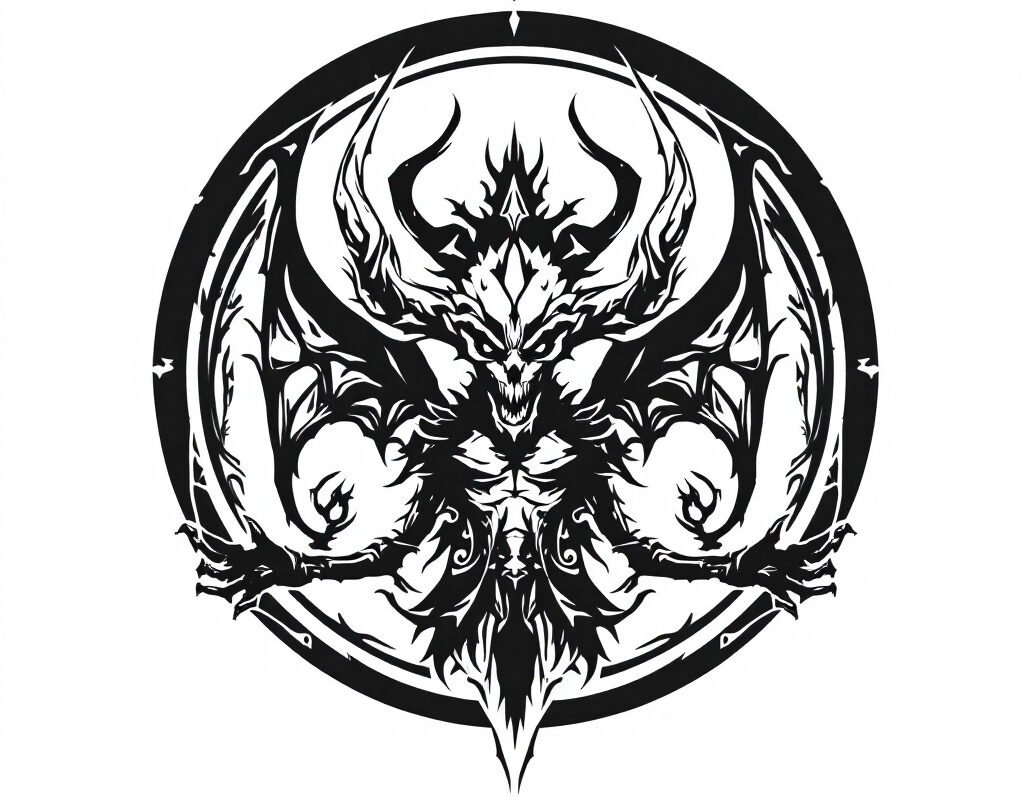Abura-sumashi is a rare yōkai that, according to legend, inhabits the Amakusa Islands and the misty mountain passes of Kumamoto Prefecture.
Known as an “oil presser,” this spirit embodies the consequences of theft in a time when oil—extracted laboriously from tea seeds—was a precious resource for lighting and heating homes. According to stories, the Abura-sumashi is the restless ghost of an oil thief who fled into the woods to evade justice.
Summary
Key Takeaways
| Attribute | Details |
|---|---|
| Names | Abura-sumashi (primary); occasional regional variants like “oil wringer” in Amakusa dialect |
| Translation | “Oil presser” or “oil wringer,” derived from pressing oil from tea seeds |
| Title | None commonly assigned; sometimes called the “Mountain Oil Ghost” |
| Type | Yurei (ghost spirit); subclass of obake (shapeshifting or transformed entities) |
| Origin | Ghost of an oil thief who escaped punishment and fled into the woods, reincarnated as a yokai for divine retribution |
| Gender | Ambiguous; depicted as male in most modern illustrations but unspecified in folklore |
| Appearance | Squat humanoid figure with a large, potato-shaped or stony head bearing a fixed, serene expression; body clad in a straw-woven raincoat (kasa); often carries a walking staff or oil bottle |
| Powers/Abilities | Sudden materialization from thin air; voice projection to startle; implied oil manipulation in modern tales |
| Weaknesses | Appears only when name is spoken; dispelled by ignoring or fleeing; no known supernatural repellents like ofuda, as it causes no harm |
| Habitat | Mountain passes and wooded trails in Kumamoto, especially Kusazumigoe Pass near wild tea groves |
| Diet/Prey | Unknown; does not consume or target humans—focuses on startling rather than sustenance |
| Symbolic Item | Oil bottle or lamp, representing stolen goods; walking staff for traversal |
| Symbolism | Divine punishment for greed and theft; impermanence of material wealth; harmony between human actions and natural/spiritual consequences |
| Sources | Folklore collections by Yanagita Kunio; works of Hamada Ryuichi; modern depictions in Shigeru Mizuki’s yokai encyclopedias |
Who or What is Abura-sumashi?
The Abura-sumashi is a somewhat strange entity within the vast pantheon of Japanese yōkai—a mysterious apparition born from human folly rather than malice.
This supernatural being is believed to be the spirit of a thief who stole oil (a precious and rare resource in Japan) a very long time ago. After escaping punishment, the thief disappeared into the dense forests, transforming into the Abura-sumashi, and wandered the woods endlessly as a warning to others.
What makes the Abura-sumashi different from many other spirits is its gentle nature. Rather than harming anyone or seeking revenge, it appears unexpectedly to people, often leaving them startled.
For those unfamiliar with yōkai, the Abura-sumashi highlights important lessons in Japanese folklore where many supernatural beings reflect the values and morals of their respective societies.
In the case of the Abura-sumashi, the oil it once stole represents hard work and the bonds within a community. Taking something so valuable disrupts harmony, leading to consequences for the thief.
“Abura-sumashi” Meaning
The name Abura-sumashi carries layers of linguistic and cultural resonance.
“Abura” directly translates to “oil” in Japanese, evoking the viscous, golden liquid essential for lamps and rituals before the widespread adoption of electricity.
The suffix “sumashi,” however, draws from the Amakusa dialect variant of “sumasu,” meaning “to press,” “to wring,” or “to squeeze”—a nod to the laborious process of extracting oil from tea seeds, or camellia sasanqua, abundant in Kumamoto’s wild groves.
Thus, the full term translates to “oil presser” or “oil wringer,” evoking a vivid image of manual toil transformed into a spectral legacy.
Etymologically, this compound reflects historical evolutions in regional speech patterns. In standard Japanese, “sumasu” implies clarification or straining, as in purifying liquids, which aligns with the process of refining oil.
Yet in Amakusa folklore, it evokes the rhythmic squeezing of seeds underfoot, a metaphor for squeezing out confessions—or perhaps sins—from the guilty.
Variations appear sparingly: some texts opt for “oil calmer” if interpreting “sumashi” as “serene face,” tying to the yōkai’s impassive potato-like head. This duality hints at post-Heian influences, where Buddhist concepts of karma infused local tales, evolving simple thief-ghosts into punitive spirits.
By the Edo period, as tea cultivation boomed, the name solidified in oral traditions, symbolizing not just extraction but the inescapable press of fate.
During feudal eras, oil theft—especially from shrines—carried severe taboos, blending Shinto purity with economic scarcity. Yanagita Kunio, the father of modern folklore studies, documented these nuances in early 20th-century collections, preserving dialectal peculiarities that standard sources might gloss over.
You may also enjoy:
Amenadiel: Origins, Hierarchy, and Demonic Attributes
January 5, 2026
Edimmu: The Mesopotamian Wind Demon That Steals Life
November 6, 2025
Abura-akago: The Oil-Licking Demon Baby
October 22, 2025
Who Is Abaddon, the Demon of the Abyss, in the Bible?
September 29, 2025
Vritra: The Dragon Who Swallowed the Sky in Hindu Mythology
October 7, 2025
Iblis, the Jinn King of Darkness and Deception
September 29, 2025
How to Pronounce “Abura-sumashi” in English
The easiest way to pronounce “Abura-sumashi” in English is by breaking it into syllables: “Ah-boo-rah soo-mah-shee.” The “a” sounds are short and open, like in “father”; “u” is a quick “oo” as in “book,” not drawn out.
Stress falls lightly on the first syllable of each part—”AH-boo-rah”—with a smooth flow into “soo-MAH-shee,” where the “sh” is soft, like “she.”
Avoid rolling the “r” aggressively; it’s a gentle flap, almost like a soft “d.”
Practice slowly: Ah… boo… rah… soo… mah… shee. In casual speech, it might slur to “Ah-bra soo-mashi.”
What Does Abura-sumashi Look Like?
Across folklore accounts, the Abura-sumashi typically manifests as a squat, humble humanoid whose form blends rustic humility with uncanny distortion.
Central to its silhouette is the head: a bulbous, irregular mass likened to a potato—lumpy, earthy, and asymmetrical—or a weathered stone smoothed by relentless rains. This feature bears an unchanging expression, often serene or poised, with half-lidded eyes that convey neither joy nor malice but an eternal, detached watchfulness.
The skin, if discernible, appears mottled and rough, as if carved from the mountain itself, devoid of hair or ornate features that might humanize it further.
The body reinforces this grounded, reclusive aesthetic. Covered in a kasa—a traditional straw raincoat woven from local grasses—it stands no taller than a child, its frame compact and bow-legged for navigating steep passes.
Arms are stubby, ending in deformed hands that clutch a sturdy walking staff (perhaps topped with a dangling oil bottle, a poignant relic of its thieving past).
In some depictions, faint wisps of ethereal glow outline the figure, suggesting its ghostly essence. Yet, it remains palpably material, crinkling like dry leaves in the wind.
Modern illustrations (influenced by artists like Shigeru Mizuki) amplify these traits: the head swells comically large, eyes slit in perpetual drowsiness, while the coat frays at the edges, hinting at the endless decay of the woodland.
Variations persist regionally. Early Amakusa tales describe a more shadowy outline, appearing from fog without distinct limbs. By the 20th century, as folklore blended with ukiyo-e styles, the yōkai gained sharper contours—a fixed smile cracking the stony façade, or subtle veins mimicking the texture of tea seeds.
Habitat
The Abura-sumashi lives exclusively in the verdant, fog-shrouded mountain passes of Kumamoto Prefecture (with the Kusazumigoe Pass serving as its legendary epicenter—a narrow, winding trail flanked by dense cedar groves) and wild tea bushes on the Amakusa Islands.
This terrain—full of steep inclines and sudden drops—mirrors the yōkai’s evasive nature: paths that twist like veins through the earth, where sunlight filters in mottled patches, casting shadows that could conceal a thousand whispers.
The yōkai’s preference for such areas likely stems from their origins. As a fugitive spirit, it haunts the very woods where oil thieves once hid, drawn to the rustle of camellia leaves that once yielded their precious extract.
Origins and History
As mentioned above, Abura-sumashi traces its lineage to the feudal underbelly of Kumamoto’s rural economy, appearing in the late Edo period amid the island province’s struggles with scarcity and sanctity.
Oil (pressed from camellia sinensis var. sasanqua seeds) was no mere fuel. It illuminated shrines, warmed hearths, and fueled rituals, rendering theft a sacrilege against both gods and kin.
As Amakusa’s tea groves flourished under domain oversight, so did tales of pilferers—desperate souls skimming communal stores, only to flee into dense woods when discovered.
Uncaught in life, these transgressors faced a terrible post-mortem verdict: reincarnation as wandering ghosts, their forms warped to mock the very labor they evaded.
This motif, blending Shinto animism with Buddhist karma, crystallized the yōkai around the 18th century, when oral histories from Kusazumigoe Pass first whispered of a “pressing shadow” that startled the guilty-hearted.
The Shimabara Rebellion (1637-1638) ravaged Amakusa, displacing farmers and heightening resource tensions. In its aftermath, oil hoarding became rampant, giving rise to legends of thieves cursed to eternal torment.
By the time of the Meiji Restoration (as modernization lowered the importance of oil), the Abura-sumashi evolved from a vengeful specter to a poignant relic—a symbol of vanishing agrarian taboos.
Later, Shinto’s focus on purity deemed oil desecration a form of pollution (kegare). At the same time, Buddhism’s wheel of rebirth framed the yōkai as a middling Hell—neither demon nor saint, but a liminal tutor.
Unlike urban obake tied to capital excesses, the Abura-sumashi remained rural, resisting Edo-period gazetteers like the Gazetteer of Famous and Secret Matters but thriving in Amakusa’s insular dialects.

Famous Abura-sumashi Legends and Stories
The Grandmother’s Tale on Kusazumigoe Pass
In the quiet hills of Kumamoto, where the winding Kusazumigoe Pass snakes through lush, tea-covered ridges, an elderly woman walked one autumn afternoon, her grandchildren holding onto her worn skirt.
The air was thick with the sweet scent of camellia pods, leftovers from the busy tea harvest that needed everyone’s help in the village. As the sun began to set, bathing the path in rich oranges and deep purples, the grandmother stopped to catch her breath.
She looked down at her curious grandchildren and shared an old tale with them. “Listen closely, little ones,” she said, her voice reflecting her many years of wisdom. “Once upon a time, in these very woods, there lived a spirit called the Abura-sumashi. He was born from a thief who stole oil from the gods and tried to escape his fate by hiding in the trees.”
The children listened intently, their eyes wide with wonder as they gathered around her. She pointed to the ancient trees reaching for the sky and continued, “This thief took what wasn’t his, stealing light from the seeds to keep for himself. But the mountain remembered him; it swallowed him whole, transforming his greed into something that never fades away.”
Just as she spoke, a strange breeze rustled through the air, bringing with it a sudden silence that made the moment feel deep and heavy. The grandmother’s story hung in the air as if the pass itself was listening.
Then, a rumbling sound emerged from the bushes. At first, it was soft, like stones rolling in a stream, but then it grew louder until it turned into words that echoed off the mountains: “And I persist!”
The voice rang out from every direction, wrapping their little group in a fog of sound. The grandchildren froze, hearts pounding in their chests, while the grandmother stood tall, gripping her staff with white-knuckled hands.
Suddenly, the air shifted, revealing a figure: short and sturdy, with a bulbous head and a calm, unchanging face. Its slitted eyes seemed only half awake, and its mouth held a quiet defiance. Dressed in a rustling straw coat, the spirit had a staff topped with an old oil flask, gesturing toward the tea groves below.
The spirit did not come closer but stood still, like part of the landscape given voice. “You talk about the past as if it were asleep,” it said, its deep voice steady and serious. “But the burden of what has been taken remains—the strength of seeds, the light that drains away. What is stolen comes back to affect the thief.”
The grandmother bowed her head in respect, acknowledging the spirit’s wisdom with a simple reply: “We understand, ancient one; the woods remember.” As the grandchildren urged her to leave, she paused for a moment, staring into the spirit’s calm gaze.
As they hurried down the path, the figure faded away quietly, blending into the mist, leaving behind only the sound of dripping water from the branches and a soft, lingering laugh: “Remember well… or face the consequences.”
You may also enjoy:
What Is a Dīv? The Terrifying Giant Demon of Persian Myth
January 22, 2026
What Is the Akkorokamui, Japan’s Colossal Sea Monster?
November 14, 2025
Who Was Hiranyaksha, the Golden-Eyed Asura?
October 7, 2025
Setcheh: Egypt’s Soul-Stealing Ancient Demon
November 11, 2025
Aamon: The Infernal Marquis of Lust, Feuds, and False Prophecies
September 29, 2025
Who Is Jann in Islamic Mythology and Why Is He Feared?
October 2, 2025
The Thief’s Eternal Flight
In the mysterious stories of Amakusa, long before electric lights brightened the nights, there lived a man named Taro. He struggled to survive on the edges of tea fields, his hands stained from making tea illegally, and his nights illuminated by the stolen light of lanterns.
Taro came from a family of serfs who had to meet harsh quotas, which left them cold and hungry while the overseers kept the extra food for themselves.
One dark night, driven by desperation, Taro snuck into the headman’s storehouse. He carefully opened clay jugs, filling his bag with the precious tea oil inside.
The scent of the tea filled the air, but a sudden noise—a broken piece of pottery crunching underfoot—interrupted his quiet. The sound drew shouts that sent him running into the tangled woods beyond the fields.
Taro ran fast, his heart racing, with the weight of his stolen oil bouncing against him. Branches scratched his face, and roots tripped him, while shouts chased him like angry ghosts. He fled deeper into the forest, seeking refuge in a place called Kusazumigoe.
By dawn, he found himself collapsed among ferns, the cold oil pressing down on him—no one following, just the trees watching silently.
Days turned into weeks as he survived on wild berries and avoided the search parties. His body grew weak, and strange whispers filled his thoughts, urging him to return, but shame held him back. He believed it was better to be lost in the woods than to face punishment.
As time passed, Taro changed in strange ways. His skin grew tough, like tree bark; his limbs shrank, and his head enlarged, resembling the roots he had once crushed. His eyes became half-closed, gazing at the world with a heavy heart.
The bag he had stolen became a staff he could never let go of, topped with a flask that was always half-full but never satisfied his thirst. He was no longer a man but a spirit, transforming into the Abura-sumashi, roaming the paths and startling travelers.
One day, a pilgrim on his way to a shrine encountered Taro. While praying for good fortune, he suddenly saw the spirit emerge from the fog, the staff pointed towards him like an accusation.
“You want something valuable?” the spirit said, its voice rough. “First, think about what you take—it has a cost.”
The pilgrim ran away, haunted by the spirit’s words, and soon, tales of Taro spread. Travelers spoke of meeting the ghostly figure that demanded respect for the things that had been taken.

Abura-sumashi Powers and Abilities
Abura-sumashi is not a powerful yōkai. Typically, it is seen as a mid-tier yōkai in the hierarchy—far less formidable than rampaging oni or soul-reaping shinigami, but more insidious than benign zashiki-warashi.
Its strength lies in psychological jolt over physical menace. He can easily scare even the most seasoned travelers, evoking primal fears of the unseen wilderness.
Compared to oil-kin like the playful Abura-akago, which drains lamps undetected, the Abura-sumashi’s invocations demand verbal bait, making it reactive yet predictably summonable.
Abura-sumashi’s powers and abilities include:
- Sudden Materialization: Instantly appears from thin air or mist when its name is uttered, often with a rustle of straw or echo of dripping oil, disorienting witnesses for escape or admonition.
- Voice Projection: Projects a booming, gravelly call across distances, replying to stories with phrases like “I still do!” to startle without pursuit, rooted in ghostly resonance.
- Oil Echo Manipulation (implied in variants): Subtly influences oil-related scents or glimmers, such as causing lanterns to flicker or flasks to slosh unnaturally, symbolizing unresolved theft.
- Ethereal Dissolution: Fades into fog or foliage at will, leaving no trace, allowing brief interventions without prolonged confrontation—ideal for its non-violent ethos.
- Serene Intimidation: Its fixed, impassive expression induces unease or reflection, a passive aura that lingers psychologically, compelling moral reckoning over force.
How to Defend Against Abura-sumashi
Defending against the Abura-sumashi relies more on cleverness than on strength. It’s also important to keep quiet when traveling alone; simply mentioning its name can attract its attention, much like a light drawing in a moth.
In Kumamoto, travelers share wisdom about how to deal with this spirit: only talk about it in well-lit inns, surrounded by kind company. If you notice an unusual silence or see tea leaves moving without any wind, be alert. The Abura-sumashi thrives on your lack of focus, appearing where you don’t look.
If you do find yourself face-to-face with this spirit, it’s best to avoid confrontation. The Abura-sumashi isn’t interested in chasing you down; it’s not built for running and tends to reveal itself only briefly.
Legends tell of travelers who met its gaze and simply said, “Your time is over; there’s nothing here for you.” This attitude seems to dismiss the spirit, causing it to vanish into mist while it chuckles softly, its flask glinting as it disappears.
Offering gifts doesn’t work as it does with other spirits like the tengu; stolen items are seen as a joke. Instead, bring clean tokens—a sprig of wild camellia tucked into your clothing, symbolizing purity, or a polished stone that resembles its head, which reflects its own vanity back at it.
Ultimately, the best way to protect yourself is to live a life free from greed. The Abura-sumashi reminds us that true protection comes from having integrity—a life without the burden of greed allows nature to remain peaceful, and the forest to be simply a lovely place, with gentle sounds in the wind.
Abura-sumashi vs Other Yōkai
| Name | Category of Yōkai | Origin | Threat Level | Escape Difficulty |
|---|---|---|---|---|
| Abura-akago | Yurei | Ghost of infant oil thief | Low (mischievous draining) | Easy: Seal lamps; it tires quickly |
| Nurikabe | Obake | Spirit blocking paths for lost wanderers | Medium (disorientation) | Medium: Kick pebbles to reveal and bypass |
| Kappa | Yokai (water imp) | Cursed river child or deformed human | High (drowning, organ theft) | Hard: Bow to spill water from head dish |
| Yuki-onna | Yurei | Vengeful snow spirit from blizzard deaths | High (freezing breath) | Medium: Avoid eye contact; warmth repels |
| Tengu | Kami/yokai | Fallen mountain monk or bird demon | Variable (prideful tricks) | Hard: Humility and martial skill required |
| Oni | Oni | Demon from hellish realms or human sinners | Very High (brute force) | Very Hard: Divine weapons or exile rituals |
| Kitsune | Yokai (fox spirit) | Divine messengers or wild fox transformations | Medium (illusion/deception) | Medium: Foxfire wards; discern true intent |
| Tanuki | Yokai (raccoon dog) | Shapeshifting trickster from forest animals | Low (pranks, leaf magic) | Easy: Laugh off illusions; gold leaf fools |
| Rokurokubi | Obake | Woman cursed with elongating neck | Medium (spying, strangling) | Easy: Seal with prayer beads at night |
| Noppera-bo | Yurei | Faceless ghost mimicking humans | Low (psychological fright) | Easy: Ignore; it fades without reaction |
| Gashadokuro | Yurei | Giant skeleton from mass starvation victims | Very High (bone-rattling bite) | Very Hard: Prayer only; no physical escape |
| Jorogumo | Yokai (spider woman) | Seductive arachnid gaining human form at 400 years | High (web entrapment) | Hard: Fire or iron; detect silk trails |
| Ittan-momen | Tsukumogami | Animated cotton roll seeking hosts | Medium (strangling flight) | Medium: Scissors or wind to shred |

Symbolism
| Attribute | Details |
|---|---|
| Element | Earth—tied to mountainous soil and tea seed extraction, grounding its punitive wanderings |
| Animal | None directly; loose ties to burrowing rodents like moles, evoking hidden theft in earth |
| Cardinal Direction | South—aligned with Kumamoto’s southern latitudes and Onmyōdō’s fiery, transformative southern quadrant |
| Color | Brown—evoking potato skin or tea-stained earth, symbolizing humble, unrefined origins |
| Plant | Camellia sasanqua—source of its oil legacy; leaves offered in rituals to honor or appease agrarian spirits |
| Season | Autumn—harvest time for tea seeds, when scarcity heightens theft temptations and yokai stirrings |
| Symbolic Item | Oil flask—dangling from staff, representing unquenched greed and the fluid boundary between sustenance and sin |
Rather than expressing anger, Abura-sumashi represents the slow, creeping effects of theft and dishonesty, illustrating how greed can gradually damage relationships over time.
In Kumamoto, local festivals known as matsuri celebrate this creature through lantern parades. The flickering lights not only honor the hard work of honest people but also serve as a way to ward off reminders of greed. Local sayings like “Steal a drop, press your soul” teach younger generations about the value of integrity and the impact of their choices.
Artistically, the Abura-sumashi often appears in traditional Japanese art, especially in ukiyo-e prints, portrayed with a humorous twist.
Its distinct potato-like head is a signature of artist Mizuki Shigeru, transforming what could be a frightening figure into something more relatable and even wise, as seen in the manga series GeGeGe no Kitaro.
In stories, it often plays the role of a mediator during natural disasters, encouraging people to confess their wrongdoings to restore harmony within the community.
You may also enjoy:
Akateko: The Bloody Hand Ghost That Guards a Cursed Temple Tree
November 14, 2025
Alû: The Mesopotamian Demon of Malevolence and Pestilence
November 10, 2025
Who Is Adrammelech in Demonology and the Bible?
October 1, 2025
Who Is Taṇhā, the Seductive Demon of Craving in Buddhist Mythology?
October 15, 2025
Who Is the Demon Andras, The Great Marquis of Discord?
January 15, 2026
Gandharva: God, Spirit, or Demon?
November 13, 2025

